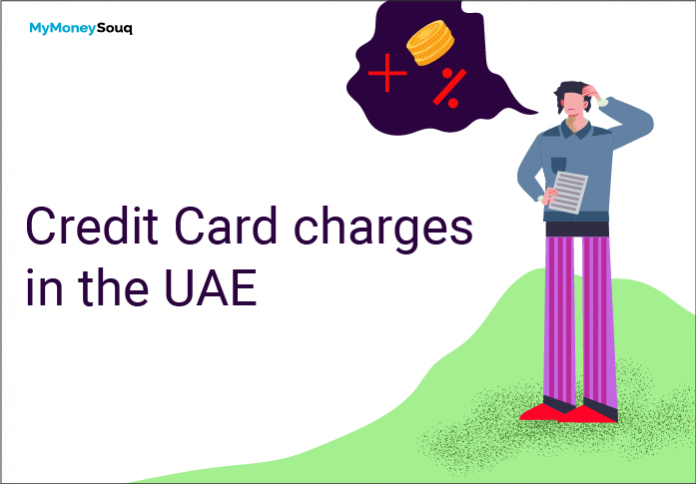Unlike debit cards, credit cards come with multiple charges associated with them. Most of us tend not to understand or avoid availing full knowledge regarding the charges related to the card. These fees and charges along with the rates included may, however, accumulate over the time and stack up into a heap of inescapable debt.
So, in order to avoid debt, it is very important to have a clear understanding of all the charges that are being levied on your credit card
Charges associated with a credit card in UAE
- Interest rates
- Annual fee
- Cash fees
- Foreign transaction fees
- Over limit charge
- Late Payment Charges
- Credit Shield
1. Interest rates
Financial literacy in UAE is comparatively low. Most of the UAE nationals are unaware of the interest rate that they are paying their credit card bills. This is very alarming given the fact that interest rates levied on credit cards in UAE are much higher, compared to any other country in the world. The interest rate that is normally advertised or communicated is on a monthly basis, which, when compounded over the year becomes staggeringly high. For example, if you get a card which has an interest rate of 3%, then be advised that this is the monthly interest rate, your annual interest rate for the card would be 3*12= 36%. Credit cards usually levy an interest rate of 2.5-3% monthly.
However, to avoid paying sky-high interests or falling in debts, you may follow a few tips:
- Every card comes with an interest-free grace period; usually, 20-30 days of the purchase. Make sure you pay the full amount of the purchases during this period.
- Avoid paying only the minimum amount; this might seem to be relieving at the moment but will land you in a huge debt eventually.
2. Annual fee
This is the fee that you will need to pay annually for the card. The annual fee charged is dependent on the type of card you own. High benefit cards have higher charges. We normally tend to not remember about this charge as it is charged annually, but this fee can have a strong impact on your statement. Some cards normally come with an advertisement of no annual fee, be advised that this is usually for a short period or only the first year. If you want to avoid this, there are also Zero annual fees credit cards in UAE.
Some tips to go about the annual fee
- Apply for cards with lifetime annual fee waived.
- Know the annual fee charged, and if will you’ll be able to pay it, before taking a card.

3. Cash fees
Most of us forget the fact that credit cards are not for cash withdrawals, and since it is convenient, we end up withdrawing cash with it. Withdrawing cash through a credit card can do some serious damage to your bank account. The charges that are associated with cash withdrawal are Cash advance; this fee is charged over the withdrawal amount, and usually is 2.5-3%. And the other fee charged is Cash in advance interest, which is also around 3% and gets charged from the day of withdrawal. A personal loan would be a better choice for emergency cash requirement, as their interest rates would be lower compared to cash advance interest rate.
The only tip to avoid these charges is to avoid withdrawing cash unless it is a matter of urgency.
4. Foreign transaction fees
Every credit card comes with a foreign transaction fee that gets charged every time you swipe your card in an international ground. Though this amount sometimes seems to be insignificantly small, it has the potential of impacting your bill significantly. The foreign transaction fee often charged is around 1.5-4%. Additionally, there are also charges such as flat conversion fee which is usually around AED 20-40.
Tip to go about this charges:
- If you are a frequent traveler, pick a travel credit card.
- Know the charges and try to use international prepaid travel cards for foreign usage.
- Never use your credit card to withdraw cash internationally, prefer using a debit card or prepaid cards.
5. Over limit charge
There is a credit limit to all credit cards. Exceeding this credit limit will not only attract over limit fees but also affect your credit score/rating. This will have consequences in the future when you require debt, as banks take Credit rating very seriously before lending money. However, if you feel the credit limit is sufficient for you, you may always approach the bank to have your credit limit raised. This will also affect your credit rating positively as it will depict that you are more creditworthy. But always keep in mind that you should only increase your credit limit if you are comfortable paying that much amount.
Tips to keep your credit in limit:
- Always keep a check on your spending.
- Increase your credit limit if necessary but never cross your set limit.
- Always pay off your balance to avoid substantial interest rates.
6. Late Payment Charges
Usually, there is a payment due date provided on a credit card to pay the bill. The cardholders should make a full payment or minimum payment before the due date. If there is no payment made after the due date or the paid amount is less than the minimum amount, then there will be a Late Payment fee charged.
Related: Are you paying Minimum Balance on your Credit Card?

7. Credit Shield
Credit cards come with a feature called Credit Shield. A credit sheild is an insurance that will cover the outstanding balance of the card if the card holder undergoes any unpredictable circumstances like job loss, accident, etc.
Some banks in the UAE charge a nominal fee on the credit shield whereas some provide it for free or make it a optional feature.
These are a few of the basic charges that are applicable to every credit card. To avoid falling into debts, it is advisable that you thoroughly understand the charges levied on your card. If in case you find some charges incomprehensible, be sure to get it cleared with your provider. A credit card could become the best source of finance when used responsibly.
About the author
Hemanta Bijoy Kaushik is a personal finance writer. Discovering his love for writing, he has written a number of blogs on personal finances and other genres on various digital media platforms. He has completed his MBA from IMT and currently working at HDFC bank as Personal Banker. When he's not writing, you can find him exploring different cuisines and binge-watching TV series. Hemanta hopes to write a novel soon. You can check out his work on www.instagram.com/hemantakaushik



